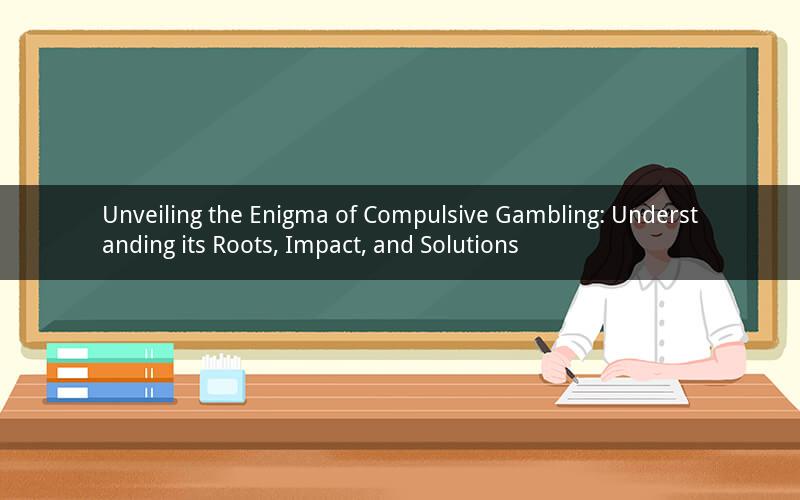
Compulsive gambling, also known as gambling addiction, is a complex condition that affects millions of individuals worldwide. This article delves into the intricacies of compulsive gambling, exploring its definition, causes, consequences, and potential remedies.
1. Definition of Compulsive Gambling
Compulsive gambling is characterized by an irresistible urge to gamble, despite the negative consequences it may bring. Individuals with this addiction often experience a loss of control over their gambling behavior, leading to significant financial, social, and psychological problems.
2. Causes of Compulsive Gambling
Several factors contribute to the development of compulsive gambling. These include:
- Genetic predisposition: Research suggests that a genetic component plays a role in the development of gambling addiction.
- Psychological factors: Individuals with certain personality traits, such as impulsivity and thrill-seeking behavior, may be more susceptible to developing a gambling addiction.
- Environmental factors: Exposure to gambling opportunities, such as casinos or online platforms, can increase the likelihood of developing an addiction.
- Social factors: Peer pressure and social influences can also contribute to the development of compulsive gambling.
3. Consequences of Compulsive Gambling
Compulsive gambling can have devastating consequences for individuals and their families. Some of the common consequences include:
- Financial problems: Individuals with gambling addiction often experience significant financial losses, leading to debt and bankruptcy.
- Social problems: Relationships with family and friends may suffer due to the time and money spent on gambling.
- Psychological problems: Compulsive gambling can lead to depression, anxiety, and other mental health issues.
- Legal problems: Individuals with gambling addiction may engage in illegal activities to fund their gambling habits.
4. Diagnosis and Treatment
Diagnosing compulsive gambling involves assessing the individual's gambling behavior and its impact on their life. Treatment options may include:
- Cognitive-behavioral therapy (CBT): CBT helps individuals identify and change their gambling-related thoughts and behaviors.
- Medication: Some medications may be prescribed to help manage the symptoms of compulsive gambling.
- Support groups: Joining a support group, such as Gamblers Anonymous, can provide individuals with a sense of community and support.
- Inpatient or outpatient treatment: Depending on the severity of the addiction, individuals may require inpatient or outpatient treatment.
5. Prevention and Awareness
Preventing compulsive gambling involves raising awareness about the risks associated with gambling and promoting responsible gambling practices. Some strategies for prevention include:
- Educating individuals about the dangers of gambling addiction.
- Implementing responsible gambling policies in casinos and online platforms.
- Encouraging individuals to seek help if they suspect they may have a gambling problem.
Frequently Asked Questions
1. Q: Can anyone develop a gambling addiction?
A: Yes, anyone can develop a gambling addiction, regardless of age, gender, or background. Certain factors, such as genetic predisposition and environmental influences, may increase the risk.
2. Q: Is there a cure for compulsive gambling?
A: While there is no definitive cure for compulsive gambling, treatment and support can help individuals manage their addiction and reduce its impact on their lives.
3. Q: How can I tell if someone has a gambling addiction?
A: Signs of a gambling addiction may include secretively gambling, borrowing money to fund gambling habits, lying about gambling activities, and experiencing emotional and financial problems due to gambling.
4. Q: Can compulsive gambling be treated with medication?
A: Yes, some medications may be prescribed to help manage the symptoms of compulsive gambling. However, medication alone is often not sufficient, and a comprehensive treatment plan that includes therapy and support is typically recommended.
5. Q: Is online gambling more addictive than traditional gambling?
A: Online gambling can be more addictive due to its convenience and accessibility. The anonymity of online platforms may also make it easier for individuals to hide their gambling habits and continue their addiction in secret.